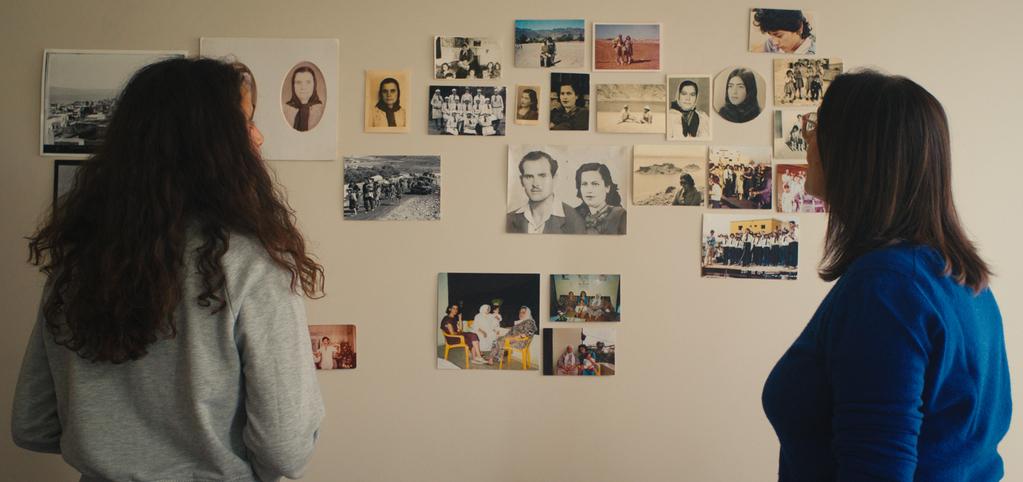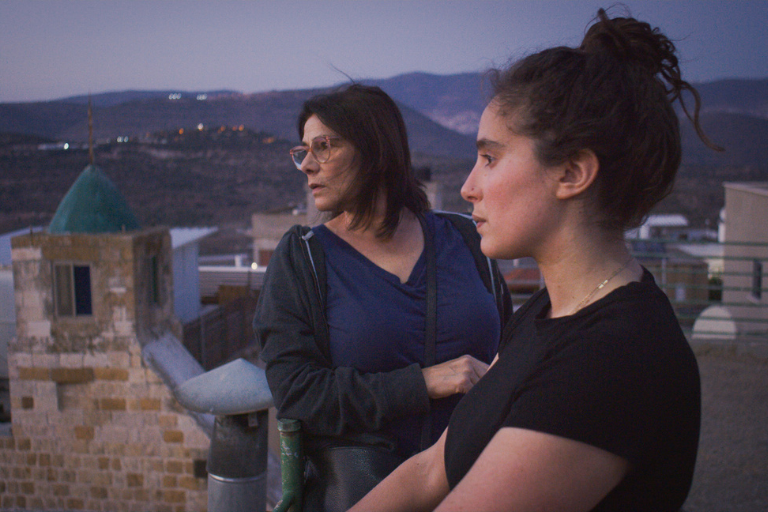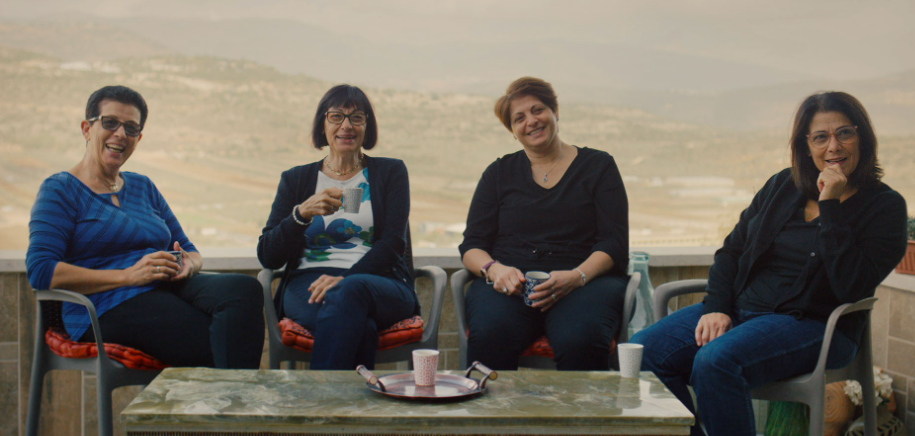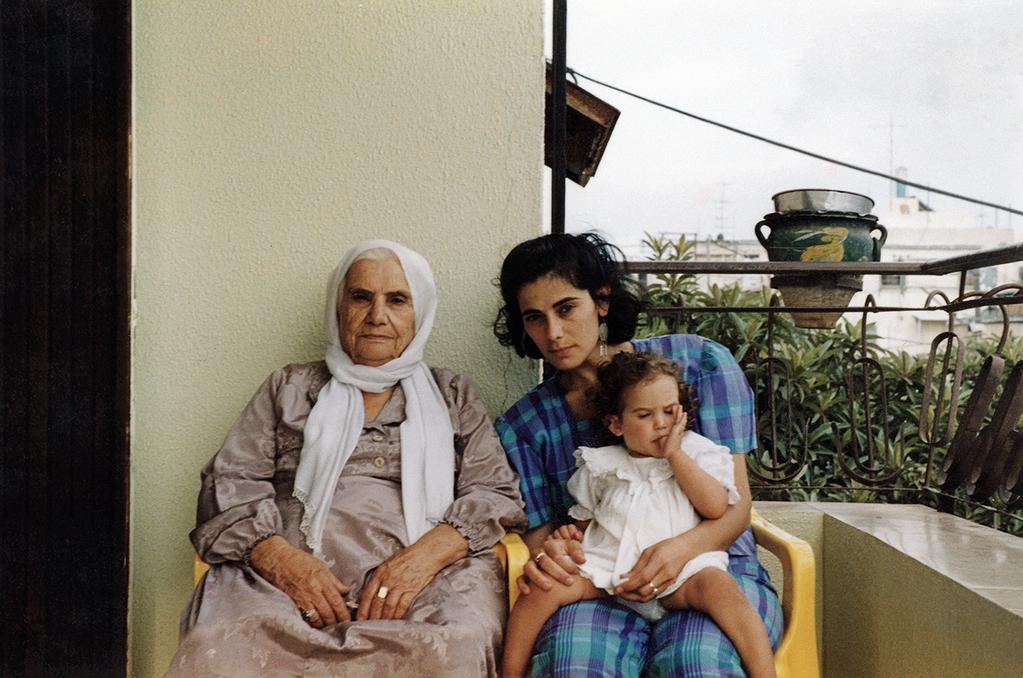“As a child, my mother took me swimming in this lake as if to bathe me in her story…I was born far from this land and far from this lake.”
It is July 18, 1992. The opening footage shows the Palestinian landscape, and we hear a woman directing us to look at the borders of Lebanon, Syria, and Jordan.
A co-production between Palestine, Belgium, France and Qatar which premiered at 80th Venice International Film Festival, Bye Bye Tiberias (2023) is a heartfelt documentary which tactfully guides us through actress Hiam Abbass’ life. We witness a young girl feeling inhibited in Palestine who leaves to fulfil her acting dreams, and then a woman re-examining the literal and metaphorical distance from her home and family.
Born in Paris, director Lina Soualem — Abbass’ daughter — is the first woman of her family to be born outside of the Palestinian village of Deir Hanna, in the city of Tabariyya (طبريا) or Tiberias in Hebrew. Soualem asks one question all throughout, can we “manage to find ourselves fully in a world we invented?”
Personal footage sketches an intimate canvas where “images of [Abbass’] past overlap those of the present”, centring the stories of four generations of women; Soualem’s great-grandmother Um Ali, grandmother Nemat, her mother Hiam [Abbass], and herself.

For the majority of the documentary, Soualem is only present on screen as a child in home videos, or is heard speaking behind the camera. Only towards the latter half of the documentary, we begin to see her occupy the same frame as her mother, embodying that increasing closeness to her mother after listening and experiencing her story.
Abbass and Soualem both exhibit that multilingual habit of shifting between languages, yet Abbass wishes for her daughter to know Arabic more fluently. Soualem argues that she “can speak it, but not read it”, but Abbass responds, “It’s never too late…[language] enriches you.”
Bye Bye Tiberias does not shy away from moments of laughter, childhood innocence and picturesque landscapes. This is best encapsulated in the scene where the family struggles to take a group photo. I also couldn’t help but giggle at Abbass and her siblings arguing over who is “the prettiest in all of the Middle East”, and who looks more like “Miss Universe 1971 Georgina Rizk”. It felt like I was watching my own family members interact, rather than Soualem picking footage that is ‘relatable’ or contributing to a cinematic facade.
Soualem engages with the concept of الغربة (el gherbe) rather than focusing on depicting a chronological timeline of Abbass’ life. While difficult to explain in all its emotional complexity, الغربة refers to the state of living abroad, and the contending with the alienation that comes with exile and the indefinite distance from you country of origin.
Up until immigrating, Abbass “could only speak Arabic, and had memories only in Palestine”, yet the documentary is not explicitly about Palestine. However, just like any Palestinian’s story, it is impossible to exist by separating one’s family history from post-Nakba (Catastrophe).

Soualem recounts the story of her great-grandmother, Um Ali who “haunts [her] memory” and is “the one with whom it all began”. Um Ali married Hosni Tabari at 15, who was named after their birthplace Tabariyya (Tiberias).
For Soualem, Um Ali only began to exist in 1948 when they were driven out of their homes. They left for Lebanon, but returned to find their village occupied, and so they sought refuge 30 km from Tiberias within the new Israeli state.
Tabari became remembered for his tendency to stop strangers to ask “have you seen my cows, have you seen my donkeys…have you seen my life?” He eventually “lost his mind and died of grief”, leaving Um Ali with only a sewing machine as a means of providing for her eight children.
As for Soualem’s grandmother, Nemat, she remained a teacher while raising ten children: Omaya, Buthayna, Johayna, Diana, Hiam, Wafa, Naief, Hanan, Jallal and Zahera.
We also are briefly told about Hosnieh, Abbass’ aunt, who after 1948, ended up on the Syrian border. Hosnieh “built another life” while awaiting an impossible return to her own.
Soualem frames her family’s experiences within the national narrative, with her grandmother saying that they were told by the British that they should leave their homes because Jewish troops had declared war on the Palestinians. Another visual entails Abbass and her grandmother standing at the beach. Some Israelis stand nearby while others party on distant boats, taking in the same view and land.
At Abbass’ childhood home, Israeli military planes fly overhead, which she explains is an ongoing threat in addition to the military bases built on the highest hills to surround Palestinian villages.
After her mother Nemat’s passing, Abbass questions whether she could ask her mother to forgive her “for making choices contrary to her traditions and life” and realises that she doesn’t “know how to mourn for a mother… [only] how to be one”.
This is contextualised in the fact that Abbass chose not return to Palestine after severing ties with her family after her first marriage. It was only until Soualem was born that Abbass realised that she could not be a mother in Paris without her own mother.
Abbass’ relationship with her father is hinted as being a source of tension. For example, upon finding a postcard with Arabic calligraphy that Abbass sent to her father, she nonchalantly states that she “thought” her father liked Arabic calligraphy. She does not elaborate, despite Soualem’s insistence. As such, this documentary does not give definitive answers about Abbass, but indicates that this mother-daughter duo will continue to interrogate their past beyond the documentary’s runtime.

Quite noticeably, none of Abbass’ filmography is mentioned or discussed — you may know Abbass from Succession (2018-2023), but I recognise her from Paradise Now (2005). Instead, Abbass’ career is only explicitly mentioned when discussing her family’s perception of her life choices.
While I would have loved to see Abbass’ journey throughout the entertainment industry, from the audition room, to navigating her way across Hollywood, Arab and European cinema, I appreciated the fact that we were not watching a Wikipedia page come to life. In other words, throughout this documentary, Abbass is not a celebrity or an actress. She is a daughter, sister and mother, amongst her family.
As for Soualem, having an Algerian father and Palestinian mother and growing up in France, inevitably influenced her personal identity and filmography:
“I never felt like I could live my different identities when I was younger, at school. I was always judged for not being French enough, not being Algerian enough – or told I couldn’t be Palestinian because Palestine doesn’t exist.”
This documentary is as much Soualem’s story as it is Abbass’ as it is Nemat’s as it is Um Ali’s. It is the story of many Palestinian women, who have lost so much and gained so much. It is the story of many who have said goodbye to their home, and have had to start all over again.
Bye Bye Tiberias played at the Palestinian Film Festival Australia.





